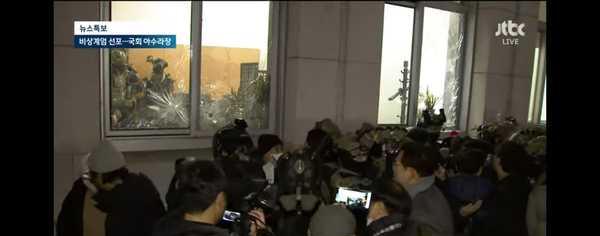South Korea's Political Crisis: Power Struggle Between President and Parliament
On December 3, South Korean President Yoon Suk-yeol declared martial law, leading to military deployment around the National Assembly. The parliament quickly voted to nullify the order, escalating tensions between executive and legislative branches.

The recent political crisis in South Korea has exposed deep rifts between President Yoon Suk-yeol and the opposition-controlled National Assembly. The dramatic events began when President Yoon suddenly declared martial law on December 3, deploying military forces including the elite 707th Special Mission Unit around the parliament building in Seoul, South Korea.
The 707th Special Mission Unit, nicknamed “White Tiger,” is South Korea’s premier counter-terrorism force. Despite their advanced training and sophisticated equipment, their deployment proved ineffective as parliament members and supporters managed to enter the National Assembly building and hold an emergency session to nullify the martial law declaration.
The core conflict stems from the increasingly antagonistic relationship between Yoon and opposition leader Lee Jae-myung. Yoon’s ruling People Power Party lost its parliamentary majority in April elections, making him the first South Korean president in decades to govern without legislative control. This has severely limited his ability to implement policies and appointments.
The opposition Democratic Party, led by Lee Jae-myung, has been aggressively pushing back against Yoon’s administration, initiating impeachment proceedings against government officials and blocking key initiatives. The president’s declaration of martial law appears to have been an attempt to reassert control, but instead has backfired and further weakened his position.
This crisis has had ripple effects beyond politics. The cryptocurrency market, which is particularly active in South Korea with over 80% of young people participating, experienced significant volatility. Bitcoin prices on South Korean exchanges saw sharp declines as political uncertainty spooked investors.
The underlying dynamics reflect a deeper struggle over Korea’s democratic institutions and the balance of power between different branches of government. President Yoon’s increasingly authoritarian moves have drawn comparisons to past military dictatorships, while the opposition claims to be defending democratic principles.
The international community, particularly the United States, Japan, and China, is watching developments closely given South Korea’s strategic importance in East Asia. The US Embassy has issued safety advisories for its citizens in South Korea, while Chinese officials have called for stability.
These events highlight the fragility of democratic systems when key political actors prioritize power struggles over governance. Rather than addressing pressing national issues, both sides appear locked in an escalating conflict that risks undermining South Korea’s democratic institutions and economic stability.